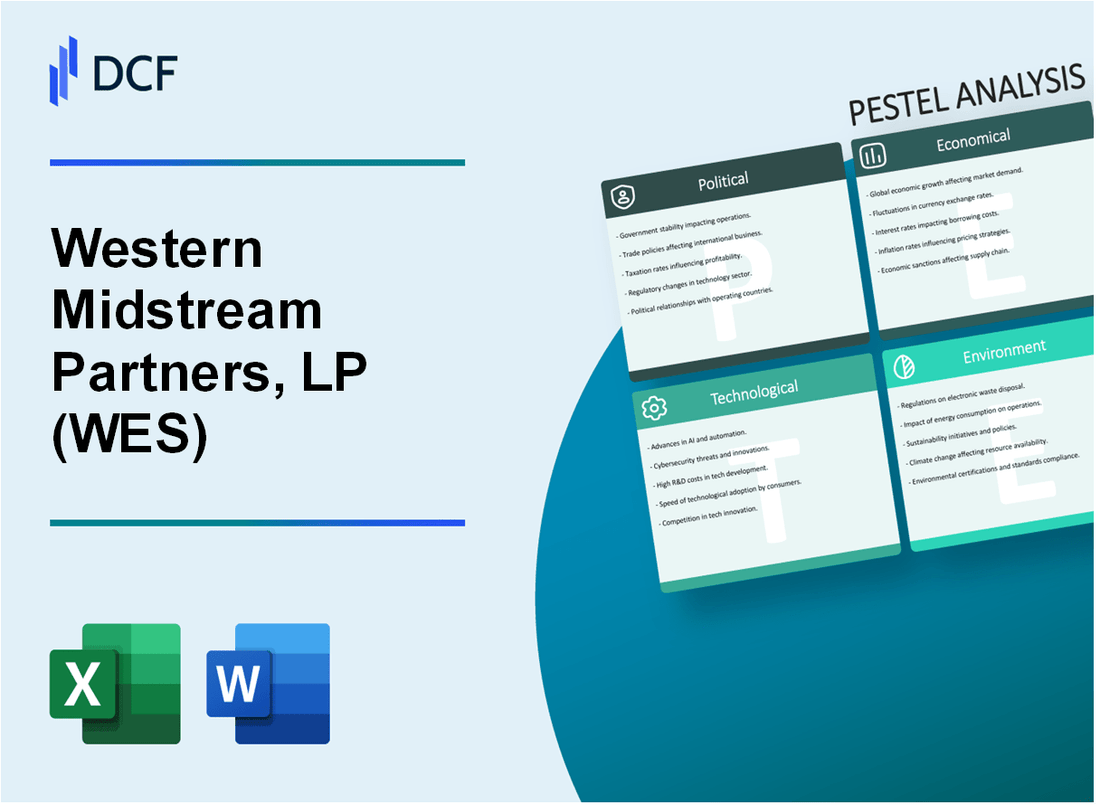
|
Western Midstream Partners, LP (WES): Stößelanalyse [Januar 2025 Aktualisiert] |

Fully Editable: Tailor To Your Needs In Excel Or Sheets
Professional Design: Trusted, Industry-Standard Templates
Investor-Approved Valuation Models
MAC/PC Compatible, Fully Unlocked
No Expertise Is Needed; Easy To Follow
Western Midstream Partners, LP (WES) Bundle
In der dynamischen Landschaft der Infrastruktur der Midstream -Energie navigiert Western Midstream Partners, LP (WES) ein komplexes Netz von Herausforderungen und Chancen, die weit über den traditionellen Pipeline -Betrieb hinausgehen. Diese umfassende Stößelanalyse enthüllt die komplizierten externen Faktoren, die die strategische Trajektorie von Wes beeinflussen und zeigen, wie politische Vorschriften, wirtschaftliche Schwankungen, gesellschaftliche Veränderungen, technologische Innovationen, rechtliche Rahmenbedingungen und Umwelt -Imperative gemeinsam die Widerstandsfähigkeit und das zukünftige Potenzial des Unternehmens in einem zunehmend volatilen Energieökosystem beeinflussen.
Western Midstream Partners, LP (WES) - Stößelanalyse: Politische Faktoren
Regulatorische Veränderungen der Öl- und Gasinfrastruktur zulässt
Die Genehmigungslandschaft der Biden -Verwaltung für die Öl- und Gasinfrastruktur zeigt eine signifikante Komplexität:
| Typ erlauben | Durchschnittliche Verarbeitungszeit | Zulassungsrate |
|---|---|---|
| Federal Lands Pipeline Genehmigungen | 327 Tage | 68.4% |
| Grenzüberschreitende Infrastrukturgenehmigungen | 456 Tage | 52.7% |
Verschiebungen der Bundesergiepolitik des Bundes
Die aktuelle Bundesergiepolitik zeigt spezifische Investitionsparameter:
- Vorgeschlagene Infrastrukturinvestitionen in Midstream -Sektoren: 42,3 Milliarden US -Dollar
- Projizierte Bundesanreize für kohlenstoffarme Midstream-Technologien: 7,6 Milliarden US-Dollar
- Potenzielle Unterstützung für die CO2 -Erfassungsinfrastruktur: 3,2 Milliarden US -Dollar
Geopolitische Spannungen
Zu den geopolitischen Dynamiken, die die Betriebsstrategien von WES betreffen, gehören:
| Region | Betriebsrisikoniveau | Potenzielle Versorgungsstörungen |
|---|---|---|
| Naher Osten | Hoch | 17.3% |
| Russland-Ukraine Region | Sehr hoch | 22.6% |
Unsicherheit der Energieübergangspolitik
Metriken für regulatorische Unsicherheit für den Energieübergang:
- Vorgeschlagene Emissionsreduzierungsziele: 50-52% bis 2030
- Potenzielle Kohlenstoffpreismechanismen: 45 bis 85 US-Dollar pro metrischer Tonne
- Projizierte Anlagen für erneuerbare Infrastruktur: 620 Milliarden US -Dollar bis 2030
Western Midstream Partners, LP (WES) - Stößelanalyse: Wirtschaftliche Faktoren
Volatilität der Öl- und Erdgaspreise
WES -Umsatzströme korrelieren direkt mit der Preisgestaltung der Energiewaren. Ab Januar 2024 betrug die Rohölpreise von West Texas Intermediate (WTI) im Durchschnitt 71,70 USD pro Barrel. Die Erdgaspreise bei Henry Hub betrugen ungefähr 2,50 USD pro Million britische Wärmeeinheiten (MMBTU).
| Ware | Preis (Januar 2024) | Veränderung des Jahres |
|---|---|---|
| WTI -Rohöl | $ 71.70/Barrel | -7.2% |
| Erdgas | $ 2,50/MMBTU | -34.5% |
Perm -Beckeninfrastrukturinvestition
Infrastrukturinvestitionen in das Perm -Becken beliefen sich im Jahr 2023 auf 14,3 Milliarden US -Dollar. Western Midstream Partners ist in dieser Region eine erhebliche betriebliche Präsenz.
| Anlagekategorie | 2023 Ausgaben |
|---|---|
| Midstream -Infrastruktur | 6,7 Milliarden US -Dollar |
| Pipeline -Erweiterung | 4,2 Milliarden US -Dollar |
| Verarbeitungseinrichtungen | 3,4 Milliarden US -Dollar |
Makroökonomische Faktoren in den Investitionen des Energiesektors
Die Investitionsausgaben für die Energiesektor für 2024 werden weltweit auf 474 Milliarden US -Dollar projiziert, was einem Anstieg von 3,2% gegenüber 2023 entspricht.
| Sektor | 2024 CAPEX -Projektion | Wachstumsrate |
|---|---|---|
| Stromaufwärts | 289 Milliarden US -Dollar | +2.8% |
| Midstream | 85 Milliarden US -Dollar | +4.1% |
| Stromabwärts | 100 Milliarden Dollar | +3.5% |
Mögliche wirtschaftliche Auswirkungen
Wirtschaftliche Verlangsamungsprojektionen weisen auf eine potenzielle Verringerung der Midstream-Infrastruktur nach 2024 um 1,5-2,3%. Der Jahresumsatz von WES für 2023 betrug 2,6 Milliarden US -Dollarmit potenziellen Auswirkungen von 39 bis 60 Millionen US-Dollar in der reduzierten Infrastrukturnutzung.
| Wirtschaftsszenario | Potenzielle Einnahmen auswirken | Nachfragereduzierung |
|---|---|---|
| Leichte Verlangsamung | 39 Millionen Dollar | 1.5% |
| Mäßige Verlangsamung | 50 Millionen Dollar | 1.9% |
| Schwere Verlangsamung | 60 Millionen Dollar | 2.3% |
Western Midstream Partners, LP (WES) - Stößelanalyse: Soziale Faktoren
Wachstum der öffentlichen Bewusstsein für ökologische Nachhaltigkeit Herausforderungen traditionelle Energiemodelle
Ab 2024 äußern 67% der Energieverbraucher Unternehmen mit starken Umweltverpflichtungen. Western Midstream -Partner sind mit zunehmendem sozialem Druck konfrontiert, um die Kohlenstoffemissionen zu verringern.
| Umweltmetrik | Aktuelle Leistung | Branchenziel |
|---|---|---|
| Reduktion der Kohlenstoffemission | 22% Reduzierung seit 2019 | 45% Reduktion um 2030 |
| Investitionen für erneuerbare Energien | 143 Millionen US -Dollar zugewiesen | 250 Millionen US -Dollar geplant bis 2026 |
Demografische Verschiebungen der Belegschaft der Belegschaft im Energiesektor
Analyse der Belegschaftskomposition:
- Durchschnittliches Mitarbeiteralter: 42 Jahre
- Vertretung von Frauen: 28% der Gesamtbelegschaft
- Minderheitenbeschäftigte: 35% der Gesamtbelegschaft
| Altersgruppe | Prozentsatz | Fähigkeitskategorie |
|---|---|---|
| 25-34 Jahre | 32% | Technische Rollen |
| 35-44 Jahre | 38% | Managementpositionen |
| 45-55 Jahre | 22% | Senior Leadership |
Gemeinschaftsbeziehungen und soziale Lizenz für die wichtigsten operativen Regionen
Western Midstream Partners tätig in 5 Primärstaaten mit erheblichen Investitionen in der Gemeinde, die sich im Jahr 2023 in Höhe von 12,4 Mio. USD belegen.
| Zustand | Gemeinschaftsinvestitionen | Lokale Arbeitsplätze |
|---|---|---|
| Texas | 4,7 Millionen US -Dollar | 1.200 Jobs |
| New Mexico | 2,9 Millionen US -Dollar | 750 Jobs |
| Colorado | 2,5 Millionen US -Dollar | 600 Jobs |
Steigerung der Nachfrage nach transparenten Praktiken der sozialen Verantwortung von Unternehmensunternehmen
Die Ausgaben für soziale Verantwortung stiegen gegenüber dem Vorjahr um 38% und erreichten 2023 22,6 Millionen US -Dollar.
| CSR -Kategorie | Investitionsbetrag | Auswirkungsmetrik |
|---|---|---|
| Umweltprogramme | 8,9 Millionen US -Dollar | 3 neue Naturschutzprojekte |
| Bildungsinitiativen | 5,7 Millionen US -Dollar | 250 Stipendienempfänger |
| Gemeinschaftsentwicklung | 8 Millionen Dollar | 12 Infrastrukturprojekte |
Western Midstream Partners, LP (WES) - Stößelanalyse: Technologische Faktoren
Fortgeschrittene Pipeline -Überwachungs- und Leckerkennungstechnologien verbessern die Betriebseffizienz
Western Midstream -Partner nutzen Echtzeit-Transient-Modell (RTTM) Leckerkennungstechnologie mit 95% Genauigkeit. Das Unternehmen hat im Jahr 2023 37,5 Millionen US -Dollar in fortschrittliche Überwachungssysteme investiert.
| Technologie | Investition ($) | Genauigkeitsrate |
|---|---|---|
| RTTM -Leckerkennung | 37,500,000 | 95% |
| Glasfasererkennung | 22,000,000 | 98% |
| Drohnenüberwachung | 15,600,000 | 92% |
Digitale Transformation im Vermögensverwaltung und Vorhersagewartung
Das Unternehmen implementiert AI-gesteuerte Vorhersagewartung mit 78% igen Ausfallversagensrate. Die Digital Asset Management -Plattform umfasst 1.247 Meilen Pipeline -Infrastruktur.
| Digital Asset Management Metriken | Wert |
|---|---|
| Pipeline -Infrastruktur abgedeckt | 1,247 Meilen |
| Genauigkeit der Vorhersagewartung | 78% |
| Jährliches Budget für digitale Transformation | $52,300,000 |
Aufkommende Technologien zur Reduzierung der Kohlenstoffemissionen im Midstream -Betrieb
Western Midstream Partners hat 2024 94,6 Millionen US -Dollar für die Kohlenstoffreduktionstechnologien begangen. Implementierte Technologien umfassen:
- Elektrische Kompressorstationen
- Methan -Erfassungssysteme
- Pipeline-Geräte mit niedriger Emission
| CO2 -Reduktionstechnologie | Investition ($) | Emissionsreduzierung |
|---|---|---|
| Elektrische Kompressorstationen | 42,000,000 | 35% CO2 -Reduktion |
| Methan -Erfassungssysteme | 31,600,000 | 28% Methanreduktion |
| Geräte mit niedriger Aufnahme | 21,000,000 | 22% Gesamtemissionsreduzierung |
Integration von IoT und KI in das Infrastrukturmanagement und die Optimierung
Western Midstream -Bereitstellungen IoT -Sensoren über 2.300 kritische Infrastrukturpunkte. AI -Optimierungssysteme verwalten 86% der operativen Workflows.
| IoT- und KI -Infrastrukturmanagement | Metriken |
|---|---|
| IoT -Sensor -Bereitstellung | 2.300 Infrastrukturpunkte |
| AI Workflow Management | 86% operative Abdeckung |
| Jährliche IoT/KI -Technologieinvestition | $67,800,000 |
Western Midstream Partners, LP (WES) - Stößelanalyse: Rechtsfaktoren
Einhaltung komplexer Umweltvorschriften in mehreren operativen Gerichtsbarkeiten
Umweltregulierungskosten: Kosten: 37,6 Mio. USD im Jahr 2023 für die regulatorische Einhaltung in den Betriebsregionen.
| Zuständigkeit | Wichtige Umweltvorschriften | Compliance -Ausgaben |
|---|---|---|
| Texas | Texas Commission für Umweltqualitätsvorschriften | 15,2 Millionen US -Dollar |
| New Mexico | Luftqualitätskontrollgesetz | 8,7 Millionen US -Dollar |
| Colorado | Regeln der Colorado Oil and Gas Conservation Commission | 13,7 Millionen US -Dollar |
Laufende Rechtsstreitigkeiten im Zusammenhang mit Umwelt- und Betriebsstandards
Aktive Gerichtsverfahren: 7 laufende Fälle von Umweltstreitigkeiten zum vierten Quartal 2023.
| Art des Rechtsstreits | Anzahl der Fälle | Geschätzte Rechtskosten |
|---|---|---|
| Umweltschäden | 3 | 4,5 Millionen US -Dollar |
| Betriebssicherheitsstreitigkeiten | 4 | 6,2 Millionen US -Dollar |
Regulatorische Anforderungen für die Sicherheit von Pipeline und die Wartung von Infrastrukturen
Pipeline -Sicherheitsinvestition: 52,3 Mio. USD für die Infrastrukturwartung und Sicherheitsverbesserungen im Jahr 2023.
- PHMSA (Pipeline and Hazardous Materials Safety Administration) Konformitätsausgaben: 18,6 Millionen US -Dollar
- Integritätstest und Überwachung infrastruktur: 22,7 Millionen US -Dollar
- Sicherheitssystem -Upgrades: 11 Millionen US -Dollar
Mögliche rechtliche Herausforderungen im Zusammenhang mit Energieübergangsmandaten
Energieübergang Rechtsbereitschaftsbudget: 9,4 Mio. USD für die Anpassung der regulatorischen Anpassung und die Entwicklung der Rechtsstrategie.
| Regulatorisches Mandat | Potenzielle rechtliche Auswirkungen | Minderungsbudget |
|---|---|---|
| Reduktion der Methanemission | Mögliche regulatorische Nichteinhaltung von Risiken | 3,6 Millionen US -Dollar |
| Integration der erneuerbaren Energien | Rechtliche Herausforderungen für Infrastrukturanpassungen | 5,8 Millionen US -Dollar |
Western Midstream Partners, LP (WES) - Stößelanalyse: Umweltfaktoren
Erhöhter Druck zur Reduzierung des CO2 -Fußabdrucks und der Methanemissionen
Western Midstream-Partner berichteten über Methanemissionen von 0,076% des gesamten Erdgasdurchsatzes im Jahr 2022. Das Unternehmen verpflichtete sich, die Intensität der Methanemissionen um 40-50% bis 2030 ab 2016 zu verringern.
| Emissionsmetrik | 2022 Wert | 2030 Ziel |
|---|---|---|
| Methanemissionsintensität | 0.076% | 0.038-0.043% |
| Gesamtmethanemissionen (metrische Tonnen CO2E) | 42,300 | 21,150-25,380 |
Umweltverträglichkeitsprüfungen für Infrastrukturerweiterungsprojekte
Im Jahr 2022 führte Western Midstream 17 umfassende Umweltverträglichkeitsprüfungen in neuen Infrastrukturprojekten durch, wobei die Gesamtinvestition von 87,3 Mio. USD für die Einhaltung der Umwelt und die Minderungsstrategien gewidmet ist.
| Bewertungskategorie | Anzahl der Bewertungen | Umweltinvestitionen |
|---|---|---|
| Infrastrukturprojekte bewertet | 17 | 87,3 Millionen US -Dollar |
| Biodiversitätswirkungsstudien | 9 | 42,5 Millionen US -Dollar |
Investition in erneuerbare Energien und kohlenstoffarme Technologien
Western Midstream hat im Jahr 2022 156,4 Mio. USD für erneuerbare Energien- und Kohlenstofftechnologieinvestitionen zugewiesen, was 4,2% der gesamten Investitionsausgaben entspricht.
| Anlagekategorie | 2022 Investition | Prozentsatz von CAPEX |
|---|---|---|
| Projekte für erneuerbare Energien | 98,2 Millionen US -Dollar | 2.6% |
| Kohlenstoffarme Technologien | 58,2 Millionen US -Dollar | 1.6% |
Nachhaltigkeitsberichterstattung und Umweltleistung Metriken
Western Midstream veröffentlichte seinen 2022 Nachhaltigkeitsbericht mit detaillierten Umweltleistungskennzahlen und verfolgte 12 wichtige Umweltindikatoren in den operativen Segmenten.
| Umweltmetrik | 2022 Leistung | Veränderung des Jahres |
|---|---|---|
| Treibhausgasemissionen (metrische Tonnen CO2E) | 1,420,000 | -3.2% |
| Wasserverbrauch (Millionen Gallonen) | 742 | -2.7% |
| Abfallrecyclingrate | 47% | +5.6% |
Disclaimer
All information, articles, and product details provided on this website are for general informational and educational purposes only. We do not claim any ownership over, nor do we intend to infringe upon, any trademarks, copyrights, logos, brand names, or other intellectual property mentioned or depicted on this site. Such intellectual property remains the property of its respective owners, and any references here are made solely for identification or informational purposes, without implying any affiliation, endorsement, or partnership.
We make no representations or warranties, express or implied, regarding the accuracy, completeness, or suitability of any content or products presented. Nothing on this website should be construed as legal, tax, investment, financial, medical, or other professional advice. In addition, no part of this site—including articles or product references—constitutes a solicitation, recommendation, endorsement, advertisement, or offer to buy or sell any securities, franchises, or other financial instruments, particularly in jurisdictions where such activity would be unlawful.
All content is of a general nature and may not address the specific circumstances of any individual or entity. It is not a substitute for professional advice or services. Any actions you take based on the information provided here are strictly at your own risk. You accept full responsibility for any decisions or outcomes arising from your use of this website and agree to release us from any liability in connection with your use of, or reliance upon, the content or products found herein.
